Following a great response to Naomi Korn's post on Creative Commons licensing, we are excited to share the second guest post in our Expert Insight Series. This week Mark Lynch, consultant and freelance art and history image specialist, explores the difficulties of creating accurate online metadata and the important responsibility of those creating it.
Don't forget you can share your comments on this post on Facebook & Twitter using the hashtag #TWAExpertInsight, or email us at enquiries@townswebarchiving.com.
 |
 |
The online legacy of information: can you be trusted to get it right? by Mark Lynch
Keeping metadata consistent and accurate during the digitisation of even the smallest collection can sometimes be a daunting task. Taking on the vast and complex image archive of one of the world’s leading art auction businesses is another matter entirely...
As manager on a project aiming to make the best of the Christie’s image library available online, I have spent the last three years working with trusted scanning and keywording resources and refining a workflow that keeps accuracy and consistency at its centre. The Christie’s name stands for expertise, accuracy and quality, and when embarking on the digitisation project this was seen to be of paramount importance to the client.
The Christie’s image library is estimated to contain around 700,000 colour transparencies of artworks and objects offered for sale over the last forty years. Each year this grows by another 30,000 digital images as new lots are shot to create the highly illustrated sales catalogues in print and online.
One thing that became apparent during the digitisation project was the online legacy of the information we make available. The images and data that we publish online, once out there, have a life that cannot be controlled. The team often found that the only web search results displayed for certain artworks or artists were based on the original Christie’s catalogue lot information, suggesting that Christie’s is (quite rightly), seen as an authority online.
However, this authority meant that a mis-attributed artist or typo on a work’s creation date could quickly be copied, adapted, and appropriated as fact by other sources creating a misleading precedent for others researching the area. So for the sake of the client we had to be 100% accurate when adding metadata.
Each piece of property consigned to auction at Christie’s is carefully evaluated, researched and catalogued by a team of experts. The result of this cataloguing is a highly detailed database of information that provides a valuable overview of the art world. But, even an expert opinion is only an opinion.
For instance, I quickly realised that the way artist names were spelled, ordered, or formatted, and their birth and death dates recorded, could be wildly inconsistent across the archive. This presented a real problem, how could anyone know they were looking at the work of the same artist if there were many different versions of the artist’s name?
In our case the answer was to create and manage an authority list so that every artist was represented consistently with the same names, spellings, and birth/death dates decided by extensive comparison across a range of trusted sources. But even this list could only be an opinion based on consensus and the information we have available.
Any regular user of the Internet quickly learns to evaluate how trustworthy the information they find in search results might actually be. Google and other search engines use clever algorithms to try and display the most authoritative and trusted links first, but in an online world, is this not merely conjecture? The information we make available online as part of our digitisation projects now leaves a legacy for future users, so in my humble opinion, getting it right first time is crucial.
Find this post interesting?
Just click to find out more about Mark's digital asset management and promotion consultancy service or contact TownsWeb Archiving.
 Next week... Ryan Kyle
Next week... Ryan Kyle
Check back here next Wednesday (4th Dec) to see the third post in our Expert Insight Series, when digital marketing specialist Ryan Kyle will be looking at different revenue generation models for digital archives.


 USE OUR ONLINE
USE OUR ONLINE








